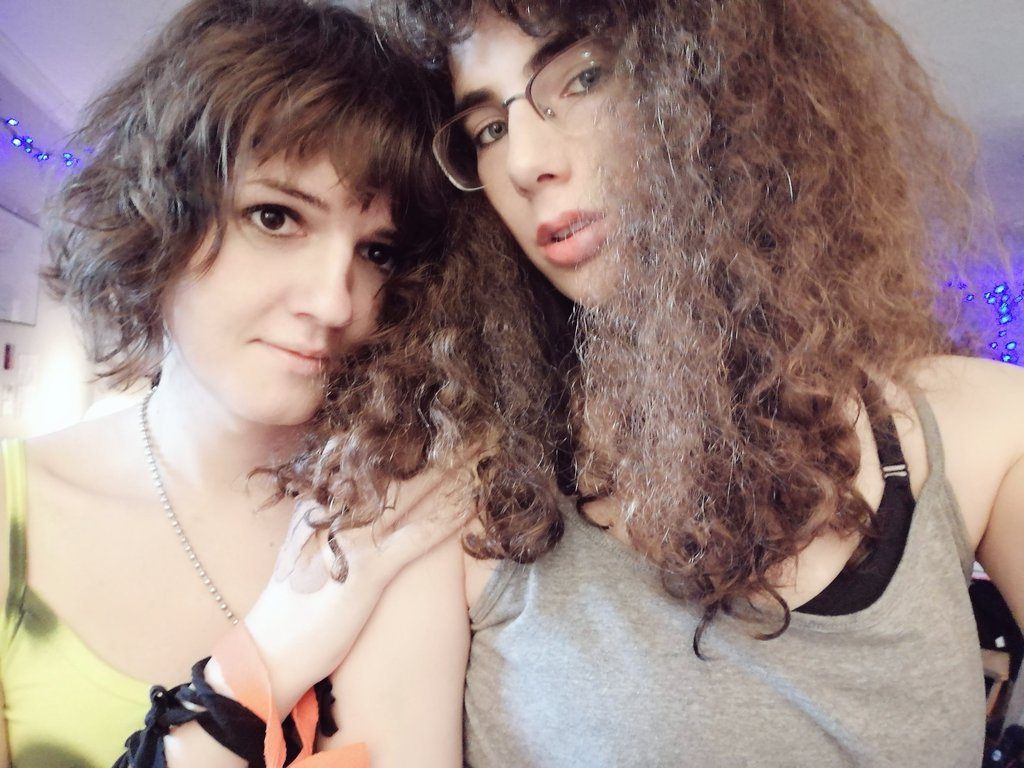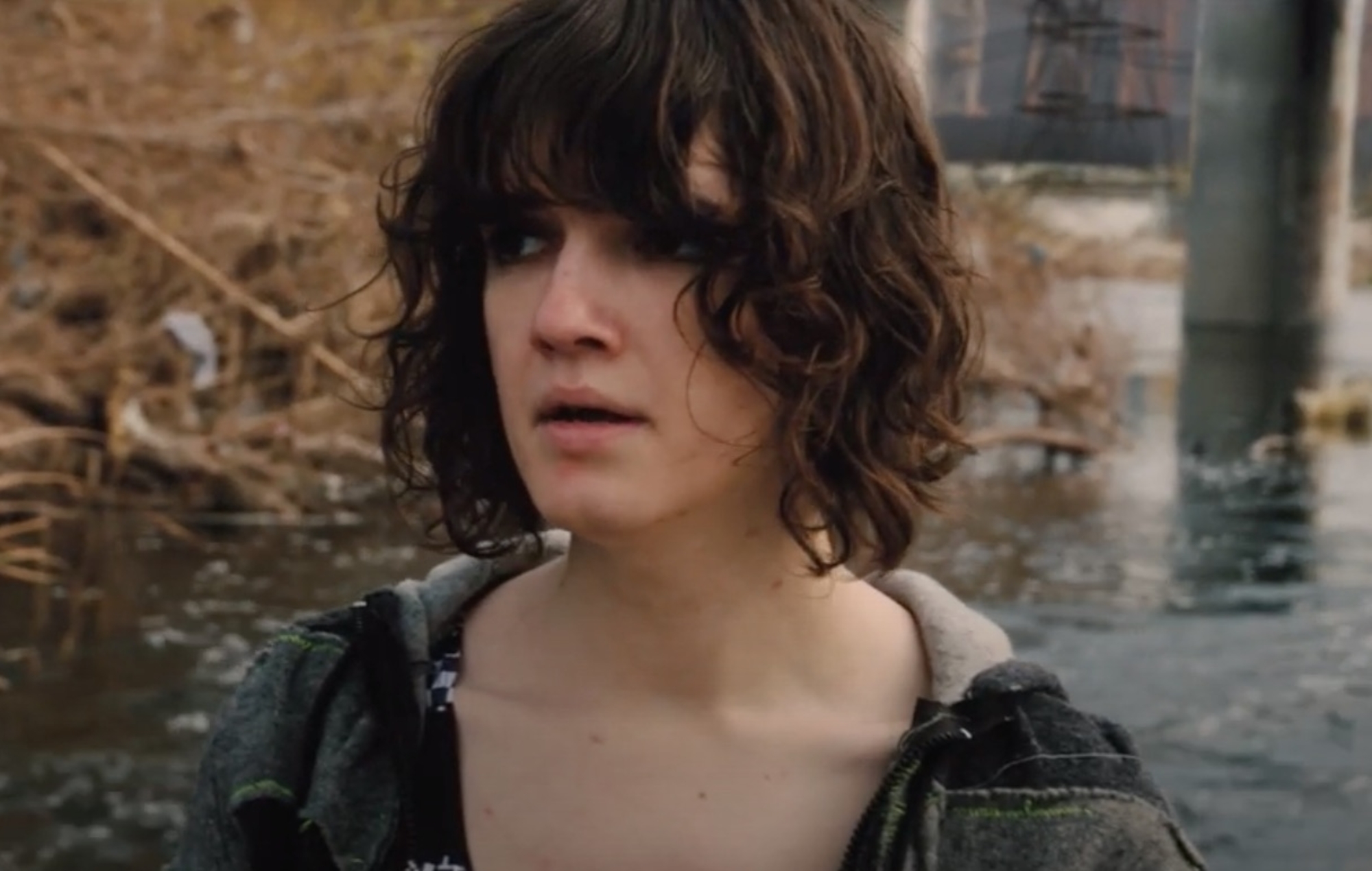Ada Rook is many things, but predictable is not one of them. Her voice can go from a gentle, impossibly fragile-sounding whisper to a guttural, metallic scream (often in the same song). And her music veers between similar extremes, from the slick neon synthpop of her work in rook&nomie to the unrestrained aggression of her grindcore project crisis sigil. Black Dresses, her group with her partner Devi McCallion and arguably her best-known band, sits somewhere in the middle, a disturbed approximation of trashy 2000s scenecore electropop mixed with punishing blasts of industrial noise. She and Devi were both fans of Nine Inch Nails growing up, and Rook cites early Ministry as an influence “before they got good at being a bad metal band,” among many others.
Just days before our interview back in February, the duo dropped a surprise album, Forever In Your Heart, all while maintaining that they were still as “broken up” as they were last summer, when they initially announced they were done as a band. Rook and McCallion remain partners and musical collaborators, but they are also broken up. Fans seem to be conflicted about whether this means they’ll continue to make new music or if they’ll only put out music that they’ve already recorded, but the ambiguity itself is clearly part of the point. Black Dresses is dead yet alive.
For all that ambiguity, Rook is pretty forthcoming in conversation, eagerly diving into the geekiest technical details of her creative process (she’s especially happy to talk guitar gear, singling out her purse-sized Mooer Radar pedal in particular as “a godsend”) and nonchalantly referring to the gradual changes in Black Dresses’ sound as having been “all kind of an accident.”
“It kinda seems like the logical progression to me if people are saying ‘this album is so dark,’” she says of the band’s latest release, “but we kinda just make music in a void, basically. I don’t think much about expectations until it’s almost coming out and then I’m like, ‘Oh, shit…’” As much as her creative process operates in a void, she still seems to be actively challenging the idea of being pinned down—to one image, one style, one performing name. “I still go by Rook, I don’t really use Ada,” she says. “When people call me ‘Ada’ it feels so weird and formal and I don’t really like it. Even the name ‘Ada Rook’ I designed to look as much like a logo as possible.”
“We kinda just make music in a void, basically. I don’t think much about expectations until it’s almost coming out and then I’m like, ‘Oh, shit…’”
Similarly, she bristles at overly literal interpretations of her work, particularly the assumption that it’s primarily about being trans. “I think it’s great if people who are just coming out as trans take it that way and it becomes really personal to them,” she says. “I think that’s beautiful, but just the broader assumption bothers me a bit. I have one song that kind of addresses being trans and that’s ‘survival meditation 2’ off of void memory, and even that’s a really passing reference. I’m just not really interested in writing about that, though lots of people seem to think I am!”
One of the projects she talks about being proudest of is her most recent solo EP, last year’s separated from her twin, a dying android arrives on a mysterious island, which she calls “the one instance where I feel like I really hit what I’d been aiming for from the beginning.” As she explains: “All the songs are based around samples I recorded off the phone when I was on hold one time, so they have that lo-fi quality. Most of the drums are sampled too, not from that same phone call, but from other songs as well, and I like the contrast of the sampled drum tracks with the lo-fi textures from the hold music. That layered, gauzy sound is like a really gentle wall of sound that I’ve been thinking about since I was a kid. That’s something that was really personal to me.”
At the opposite end of the sonic spectrum is the punishingly heavy Crisis Sigil, whose first EP she started recording while waiting out a layover on a trip to California. “I just got a Monster energy drink from the vending machine and wrote these really anxious, hardcore drum tracks in the airport. Then, months later, I came back to them and wrote all the guitar for the first EP in, like, two hours or something. I just made everything up on the spot in a random tuning, I think it was standard with the E string tuned down to C so I couldn’t even play low power chords.” Crisis Sigil is just one of many projects of hers that incorporates unorthodox guitar sounds (the glitchy solo in rook&nomie’s “Let Me Live,” for instance, is the result of her running a heavily edited guitar solo through autotune), and it seems like the logical outgrowth of her broader fascination with “fucked-up” production sounds—particularly on metal albums that break out of what she calls the genre’s “cookie-cutter” aesthetics. (She urged me to check out Vanilla Ice’s ill-fated nu-metal album Hard to Swallow: “It has the same production as the first Slipknot album!”)
When I ask her about any overlooked deep cuts in her discography, she refers me to 2016’s Deep Nausea and Void Fantasy, both of which she wrote “in a haze” before moving to Vancouver. “I think Deep Nausea’s kind of a better record, but Void Fantasy I think of as being more significant in terms of the industrial influence that a lot of my work has. Void Fantasy was my first time doing tracks that felt like, “Oh, this is a real banger,” which was a new feeling to me. ‘Dream of the Sky and the Ritual and the Damage’ might still be one of my best songs—I don’t know if I’ll write a better song than that.” During this same period, she discovered the music of her future rook&nomie collaborator ESPer99, then known as Neotonomie. “I’d go on there, download all her music, walk around the town I lived in at night, and just be like ‘I can’t wait to get out of here,’” she says with a laugh.
After her move to Vancouver, she shifted once again to Toronto, while making a brief stop in Montreal along the way. The chaos of this transitional period is partly reflected in the lyrics of her 2018 solo album shed blood. “I moved across the country as I was making that to go live in my friend’s kitchen, but it was, like, a snap decision and I barely had the money to make it work. I actually mailed my stuff there,” she laughs. “I just took my laptop, mailed everything there in boxes, and then picked it up from the post office and dragged it back to my friend’s apartment. So yeah, that album is kind of about starting over, or realizing you can just run away if you want to.
“I don’t like talking about this stuff specifically, but just in general, there’s a lot of pressure to be like, ‘oh, family is the most important thing’ and for a while I thought that what I wanted was to have a different family, like a chosen family. I had that for a while with friends I’m still really close to and are still really important to me, but I kinda feel like the whole concept rubs me the wrong way,” she says. “The stuff that’s worked for me the most doesn’t really feel like it has a name, you know? It’s the same as identifying with ‘communities’ and stuff, I don’t really do any of that. I kind of just prefer to build something that works out of smaller pieces.”

Credit: Courtesy of Bandcamp
Across all her projects, one often finds recurring themes of isolation, longing for connection and disillusion with the prevailing social order, and there’s an aching, open-wound sincerity that’s present in even some of her angriest, most confrontational work. Black Dresses’ “DEATH/BAD GIRL” sums up this dichotomy perfectly, starting as an electro-industrial ode to friendships between girls who are “fucked in the head” that could clobber Bikini Kill’s “Rebel Girl” in a fistfight. But then the song gives way to a disarmingly vulnerable monologue where Rook quietly admits, “It took me 28 years to find anyone who made any sense to me.”
These days, though, it seems like she’s found a pretty wide network of sympathetic friends and collaborators—perhaps the most well-known among them being Polaris Prize-winning rapper Backxwash, whose latest single features Rook screaming the main vocal hook. Rook describes Backxwash as “such a sweetheart, and obviously an incredible musician,” and has mentioned that the next Crisis Sigil album will be a collaboration between the two, a tantalizingly rare instance of a grindcore/hip hop crossover. (As of this writing, Backxwash has tweeted that their collaboration has evolved into a new project called “Ugly Hag.”)
“Working with people for me has historically been really hard,” she says. “I was definitely kind of a control freak growing up, you know, I would try to do everything myself because I thought that I could do it the best. But I feel like working with ESPer99 on rook&nomie, working with Charity on Sticky Zeitgeist and, of course, working with Devi, those were really healthy collaborations which I hadn’t really experienced before those points. I learned a lot from those.”
Towards the end of our Zoom interview, Rook tells me she has “an exclusive debut” for me and drops out of frame. I scramble for my headphones, anticipating a clip from either her upcoming solo album or the new Crisis Sigil album. Turns out the “exclusive debut” is neither of these things, but is actually a guitar she just bought for an upcoming music video. “I just wanted to show you that, I thought you might think it was cool,” she says with a grin. Of course. I should have known to expect the unexpected.
Correction: June 2, 2021 5:02 pmThe original version of this story was changed to better reflect that status of one of Ada Rook’s projects and to add the correct spelling of ESPer99’s name.


 Why you can trust Xtra
Why you can trust Xtra


